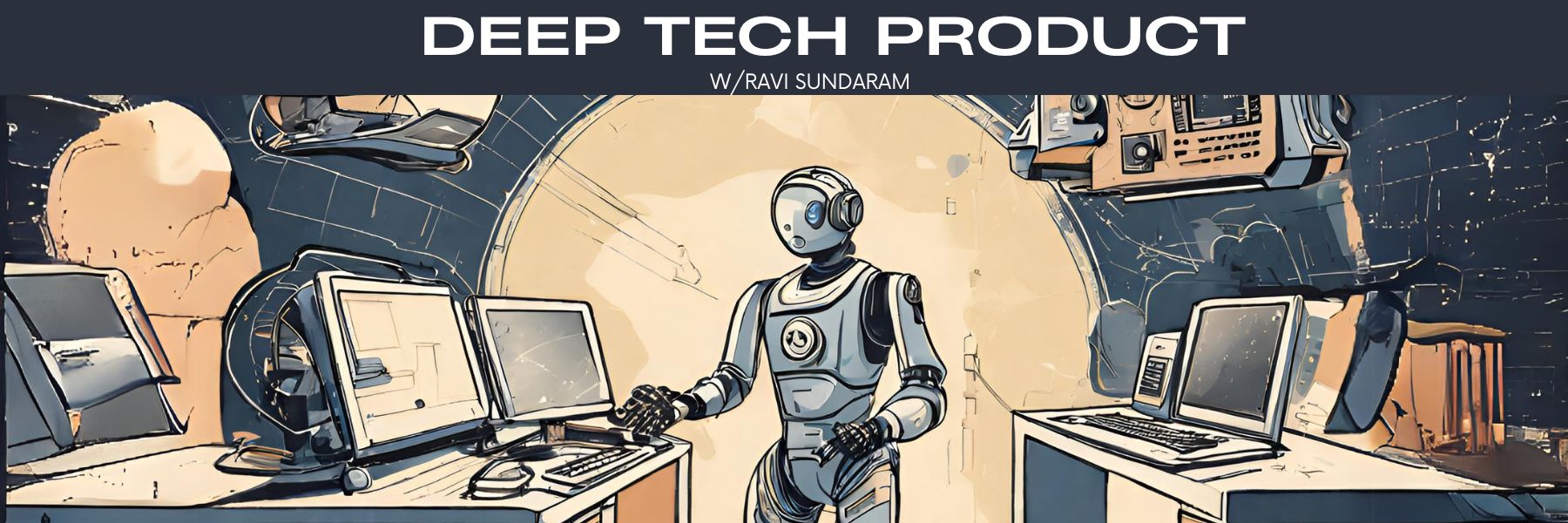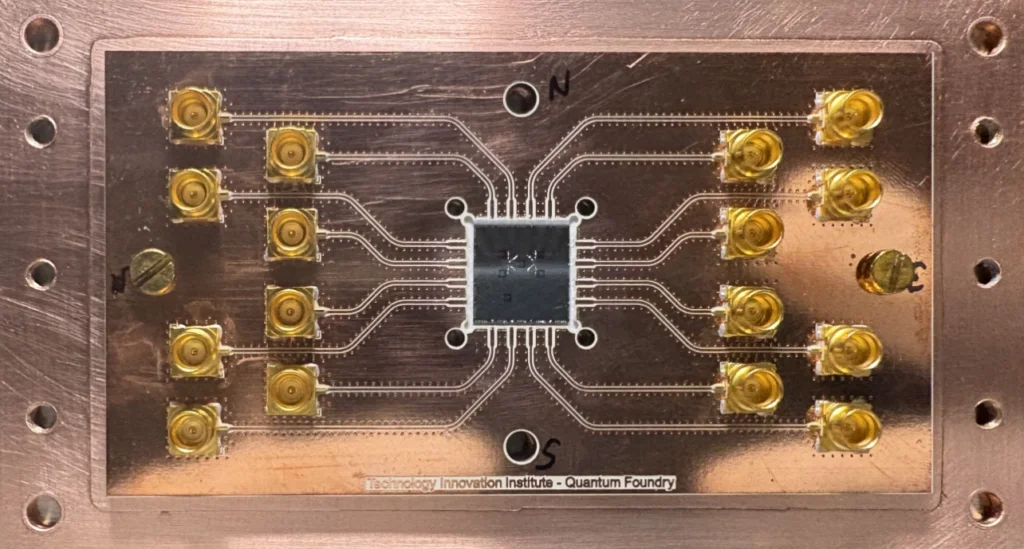In this episode of deep tech product we explore the world of quantum computing and performance management with Maria Maragkou, VP of Product at Riverlane. Maria’s journey, from physicist to product leader, offers a unique perspective on navigating the complexities of deep tech. Her insights, shared during our conversation, highlight how Riverlane’s approach to product development directly influences how they measure and drive performance in this rapidly evolving field.
Prefer listening? …….Audio versions on Apple podcasts, Spotify.
Subscribe to the newsletter and join the community for free :https://deeptechsyndicate.substack.com/
Maria emphasizes that true innovation in deep tech, particularly in a field as nascent as quantum computing, necessitates a shift from seeing the customer as simply a recipient of a finished product to viewing them as a critical stakeholder and partner in the innovation process. This approach aligns closely with the concept of “ecosystemic innovation” discussed in Ron Adner’s book, The Wide Lens, which Maria recommends in the podcast.

Here’s how Maria articulates this customer-centric approach at Riverlane:
- Early and Continuous Engagement: Riverlane actively involves customers throughout the development process, starting with the prototype phase. This approach ensures that the product’s evolution is directly shaped by the needs and feedback of those who will ultimately be using it.
- Feedback as a Key Performance Indicator: Instead of solely focusing on internal metrics like development timelines or feature releases, Riverlane prioritizes the quality and speed at which they can incorporate customer feedback. This underscores their understanding that in a rapidly evolving field, customer needs are not static and must be continuously reassessed and integrated into the product roadmap.
- Building Long-Term Partnerships: Maria emphasizes that Riverlane seeks to cultivate long-term, collaborative relationships with their customers rather than simply chasing short-term sales. This approach recognizes that in a complex and evolving field like quantum computing, the customer’s understanding of their own needs and the technology’s potential applications will likely evolve alongside the product’s development. By working closely together, both Riverlane and their customers can navigate this uncertainty and co-create solutions that deliver true value.
This collaborative approach to innovation not only helps Riverlane build a product that aligns with market needs but also fosters a sense of shared ownership and investment with their customers, paving the way for stronger, more sustainable partnerships in the long run.
Other key takeaways:
Embracing Uncertainty, Redefining Success:
One of the core takeaways from our conversation is Riverlane’s embrace of an iterative, customer-centric product development process. This approach, termed “acty” in our discussion, stands in stark contrast to the traditional linear methods often ill-suited for the dynamic world of deep tech. Maria explains that this iterative model is crucial for navigating the uncertainty inherent in the quantum computing industry, where customer needs and technological capabilities are in constant flux.
Instead of fixating on delivering a final product based on a rigid set of initial requirements, Riverlane prioritizes continuous learning and adaptation. This involves:
- Early and Frequent Prototype Releases: This allows for constant customer engagement and feedback, ensuring that the product’s development remains aligned with the evolving demands of the market.
- Integrating Customer Feedback as a Key Metric: Rather than solely focusing on output-based metrics like the number of features delivered, Riverlane prioritizes the quality, speed, and impact of customer feedback integration. This shift reflects their understanding that in a field as nascent as quantum computing, even customers may not fully grasp their needs or the potential solutions.
Building High-Performing Teams for a Complex Landscape:
Maria emphasizes that this iterative approach necessitates not just a shift in product development but also a change in how teams are structured and managed. Key takeaways include:
- Psychological Safety and Embracing Failure: Building a culture where team members feel safe to experiment, fail, and learn from their mistakes is crucial. Maria highlights an example where the engineering team challenged a feature request from leadership, leading to a more robust and efficient solution.
- Fostering a Growth Mindset: Attracting and retaining top talent in the competitive deep tech space requires more than just appealing compensation packages. Maria emphasizes the importance of providing opportunities for continuous learning and growth, feeding the “hunger” that often draws individuals to such cutting-edge fields.
- Breaking Down Silos: Riverlane encourages close collaboration between product and business development teams, recognizing that in a rapidly evolving market, a unified approach to customer engagement and feedback is crucial.
Book Recommendations:
Maria generously shared several book recommendations that have influenced her approach to both innovation and team management:
Innovation:
- The Innovator’s Dilemma and other works by Clayton Christensen
- The Wide Lens: A New Strategy for Innovation by Ron Adner
- The ‘act and see’ approach to innovation with uncertainity
People and High-Performing Teams:
- Dare to Lead by Brené Brown
Join the Conversation:
We encourage you to listen to the full episode and share your thoughts. What resonated with you most about Maria’s approach to product development and performance management in the world of quantum computing?
Brought to you by:
Deep Tech Syndicate— A community of product leaders in deep tech , join us today! https://deeptechsyndicate.substack.com/
With support from :
- The Quantum Insider- the world’s leading database on quantum investments and market activity. TQI provides insightful data and analysis to navigate the rapidly evolving quantum landscape. Visit https://thequantuminsider.com/ to learn more
Ravi’s LinkedIn: https://www.linkedin.com/in/sundaramravi/
For inquiries about sponsoring/supporting the podcast, email deeptech.syndicate@gmail.com
#deeptech #productmanagement #semiconductors #innovation
Timestamps:
(00:00) Teaser
(01:13) Podcast Intro
(01:46) Chris Intro
(03:27) PM in semiconductor equipment market
(05:35) Market cycles and understanding customer needs
(07:50) Translating customer problem to product
(11:03) Example of a new product process from a trend
(15:50) Voice of customer process is nebulous
(16:30) How to uncover the customer challenge in stages?
(18:56) Balancing customer problems vs hitting market timing
(25:25) Navigating forward looking market timing using roadmaps
(27:57) Impact of geopolitics on product launch and roadmaps
(30:48) Advice for people getting into space products
(31:33) Frameworks for prioritization of resources
(39:00) How to keep teams motivated ?
(42:25) Advice to product managers
(47:12) Book recommendation
(51:30) Outro and links to join the deep tech product community














